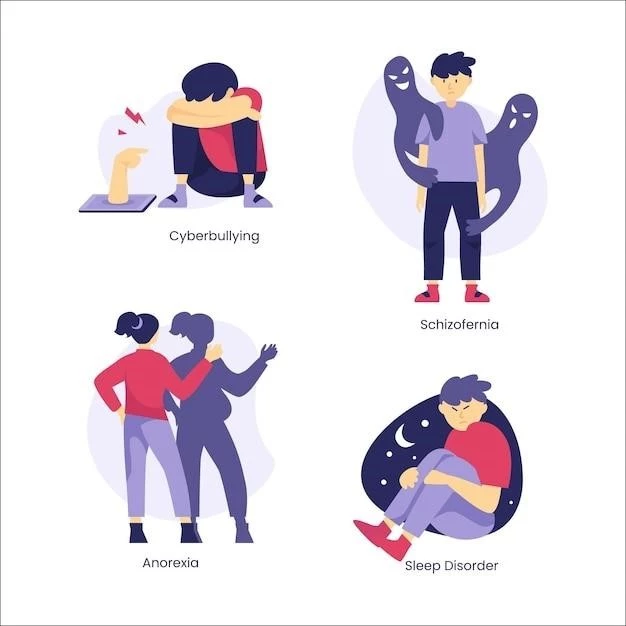Understanding Sociophobia
The term ″Sociophobia″ refers to an intense and irrational fear in social situations‚ causing distress and impaired functioning.
Definition and Overview
Sociophobia‚ also known as social phobia or social anxiety disorder (SAD)‚ is characterized by an intense‚ excessive‚ and irrational fear in social situations. People with sociophobia can experience extreme nervousness and discomfort in crowds or when interacting with others‚ particularly strangers.

Types of Social Phobias
Social Anxiety Disorder (SAD)⁚ Marked by fear of judgment; Agoraphobia⁚ Extreme fear in places with difficult escape; Specific Phobias.
Social Anxiety Disorder (SAD)
Social Anxiety Disorder (SAD)‚ also known as social phobia‚ is a type of anxiety disorder characterized by an intense fear of being judged or embarrassed in social situations. This fear can lead to significant distress and avoidance of social interactions.
Agoraphobia
Agoraphobia is an anxiety disorder characterized by an intense fear of situations where escape might be difficult‚ such as crowded spaces or leaving home. This fear can lead to avoidance behaviors and significant distress.
Specific Phobias
Specific phobias refer to intense fears of specific objects or situations‚ such as flying‚ heights‚ or animals‚ leading to avoidance behaviors and significant distress when confronted with the phobic stimulus.
Physical symptoms of sociophobia may include trembling‚ sweating‚ nausea‚ rapid heartbeat‚ and muscle tension.
Physical Symptoms
Physical symptoms of sociophobia often include trembling‚ sweating‚ nausea‚ rapid heartbeat‚ muscle tension‚ and other signs of heightened anxiety.
Behavioral Symptoms
Behavioral symptoms of sociophobia may manifest as avoidance of social situations‚ excessive self-consciousness‚ difficulty making eye contact‚ or feeling overwhelmed in social interactions.
The recognition of sociophobia involves identifying intense and irrational fears in various social situations that lead to distress.
Potential Causes
The potential causes of sociophobia can be attributed to genetic‚ environmental‚ and psychological factors. Traumatic social experiences or a family history of anxiety disorders may also contribute to the development of sociophobia.
Recognizing Sociophobia
Recognizing sociophobia involves identifying irrational and extreme fears in social situations that lead to significant distress and impairment in daily functioning.
Sociophobia can lead to strained relationships‚ isolation‚ and difficulty forming new connections‚ impacting both personal and professional life.
Professional Challenges
Professionally‚ sociophobia can lead to difficulties in networking‚ attending meetings‚ giving presentations‚ and advancing in one’s career due to the fear of judgment and scrutiny in social environments.
Effects on Relationships
Sociophobia can lead to strained relationships‚ feelings of isolation‚ and challenges in forming new connections‚ affecting personal and professional aspects of life.
Possible treatments for sociophobia may include psychotherapy‚ such as cognitive-behavioral therapy (CBT)‚ exposure therapy‚ or group therapy‚ to address the underlying fears and develop coping strategies.
Medication
In some cases‚ medication such as antidepressants or anti-anxiety drugs may be prescribed to help manage the symptoms of sociophobia and improve overall well-being.
Psychotherapy
Psychotherapy‚ such as cognitive-behavioral therapy (CBT)‚ can be beneficial in treating sociophobia by addressing underlying fears and developing effective coping mechanisms for social situations.
Common coping mechanisms for sociophobia include gradual exposure to feared social situations‚ relaxation techniques‚ and positive self-talk to challenge negative thoughts.
Tips for Overcoming Sociophobia
To overcome sociophobia‚ individuals can benefit from gradual exposure to social situations‚ practicing relaxation techniques‚ challenging negative thoughts‚ focusing on others‚ controlled breathing‚ facing fears gradually‚ and engaging in social activities to improve confidence and reduce anxiety.
Sociophobia has been portrayed in various books and films‚ depicting the struggles individuals face in social situations and the impact it has on their lives and relationships.
Portrayal in Books and Films
The portrayal of sociophobia in various books and films sheds light on the challenges individuals face in social situations‚ highlighting the impact it can have on their personal and professional lives.
Sociophobia‚ also known as social phobia‚ differs from social anxiety disorder in terms of the intensity of fear and its impact on daily life and relationships.
Distinguishing Between the Two
Sociophobia‚ or social phobia‚ and social anxiety disorder (SAD) differ in the intensity of fear and its impact on daily life‚ relationships‚ and ability to function in social situations.
Sociophobia can have a profound impact on individuals‚ affecting their confidence‚ relationships‚ social interactions‚ and overall well-being.
Impact on Individuals
Sociophobia can profoundly impact individuals by affecting their confidence‚ relationships‚ social interactions‚ and overall well-being‚ leading to feelings of isolation and difficulty in forming new connections.
Various public figures have shared their experiences with sociophobia‚ shedding light on how this condition can affect individuals in the spotlight.
Cases of Sociophobia in Public Figures
Public figures have come forward to share their struggles with sociophobia‚ shedding light on the challenges they face in social situations and the stigma surrounding mental health issues.
Ongoing research in the field of sociophobia aims to improve our understanding of the condition and develop more effective treatment strategies for individuals affected by it.
Advancements in Understanding and Treating Sociophobia
Ongoing research on sociophobia aims to enhance our comprehension of the condition and develop more targeted and effective treatment methods to assist individuals struggling with sociophobia.

